Learn everything you need to know about brake fluid leaks.
This comprehensive guide answers the question “Does brake fluid leak when the car is off?”
We’ll explore the hydraulic system, common leak locations, warning signs, and the dangers of driving with a leak.
You can keep your car safe and optimize your brake performance with this informative resource.
Can A Brake Fluid Leak Happen When The Car Is Off?
Yes, a brake fluid leak can occur even when your car is off.
Your car’s brakes use a hydraulic system, they rely on fluid pressure to operate.
Brake fluid is the essential component that transmits this pressure throughout the system when you press the brake pedal.
Unlike engine oil, which only circulates when the engine is running, brake fluid remains under pressure even in a parked car.
This constant pressure ensures your brakes are ready to respond immediately when you need them.
Unfortunately, this constant pressure can also expose weaknesses or damage to the brake system, leading to a leak.
However, a brake fluid leak is a serious issue.
Brake fluid is essential for safe braking, and a leak can significantly reduce braking performance.
In severe cases, a complete brake failure can occur, putting you and others on the road at risk.
What Are The Signs Of A Brake Fluid Leak?
A brake fluid leak is a serious issue that can compromise your car’s safety.
Luckily, several warning signs can indicate a leak before it becomes a major problem.
Here are some key things to watch out for:
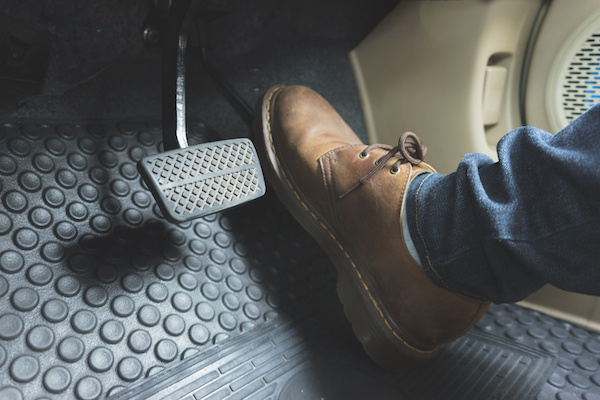
- Spongy Brake Pedal: This is a common sign that there’s air in your brake lines, which can be caused by a leak. When you press the brake pedal, it feels soft and goes down further than usual before engaging the brakes. This lack of firmness makes it harder to control your stopping power.
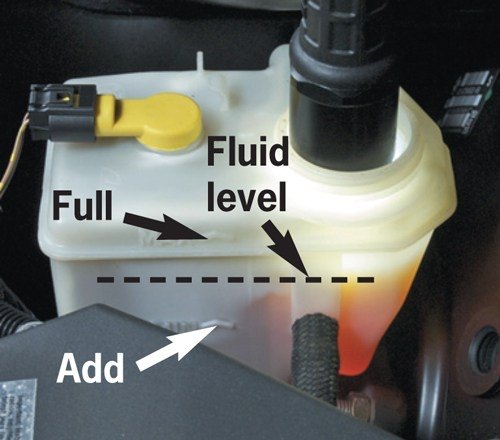
- Low Brake Fluid Level: Your car has a brake fluid reservoir, which is a small container that holds the brake fluid. Most reservoirs have a minimum and maximum fill line marked on the side. If you check your brake fluid level and find it’s below the minimum line, it could be a sign of a leak.
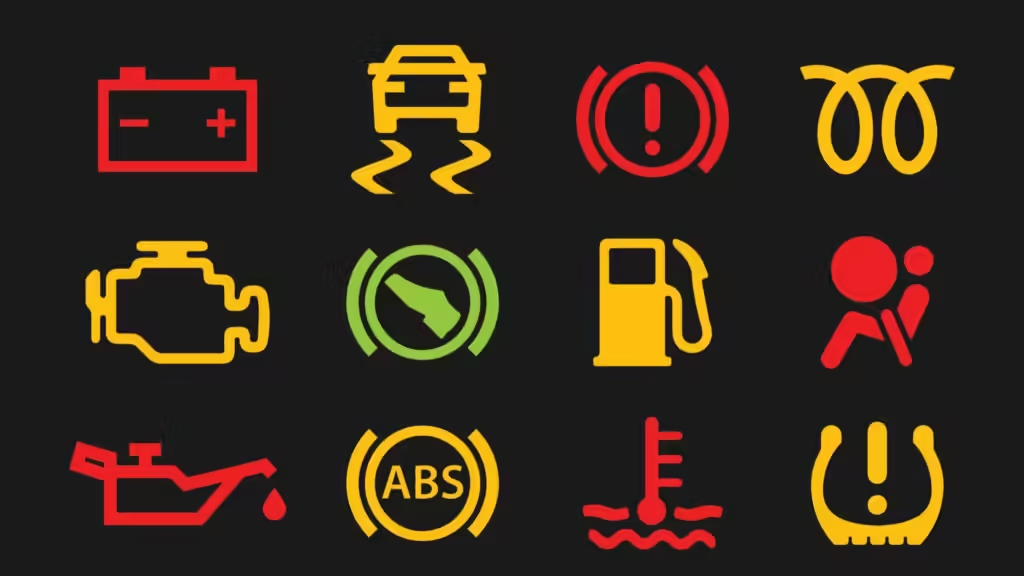
- Warning Light: Many cars have a dashboard warning light specifically for the brake system. If this light illuminates, it’s a clear signal that there’s an issue with your brakes, and a leak could be the culprit. Don’t ignore this warning sign!
- Unusual Sounds: In some cases, a brake fluid leak might produce a hissing or dripping sound, especially around the wheels. This is a less common sign, but it’s worth noting if you hear any unexplained noises near your brakes.
- Visible Leak: While not always easy to spot, if you notice puddles of yellowish or brownish fluid under your car, particularly near the wheels or under the front of the vehicle, it could be leaking brake fluid. Brake fluid has a slightly oily texture and a distinct, unpleasant odor.
If you experience any of these signs, it’s important to get your car checked by a qualified mechanic as soon as possible.
Is It Dangerous To Drive With A Brake Fluid Leak?
Yes, driving with a brake fluid leak is extremely dangerous and should be avoided at all costs.
Here’s why:
- Brake Failure Risk: Brake fluid is essential for proper brake function. It transmits the pressure you apply to the brake pedal throughout the system, ultimately creating the friction that stops your car. A leak compromises this hydraulic pressure, reducing the braking power significantly. In severe cases, the leak can deplete the brake fluid entirely, leading to complete brake failure. This means you might not be able to slow down or stop the car when needed, putting yourself and others on the road in serious danger.
- Unpredictable Braking: Even a small leak can affect how your brakes perform. You might experience a spongy brake pedal that feels soft and requires more pressure to engage the brakes. This can make it difficult to modulate your braking force and come to a smooth, controlled stop, especially during emergencies.
- Increased Stopping Distance: Due to the reduced braking power, it may take much longer for your car to stop with a brake fluid leak. This is particularly risky on high-speed roads or in heavy traffic, where quick reaction times are crucial for avoiding accidents.
Where Are The Common Locations For Brake Fluid Leak?
While a brake fluid leak can occur anywhere in the system, some components are more prone to leaks than others.
Here are some of the most common locations:
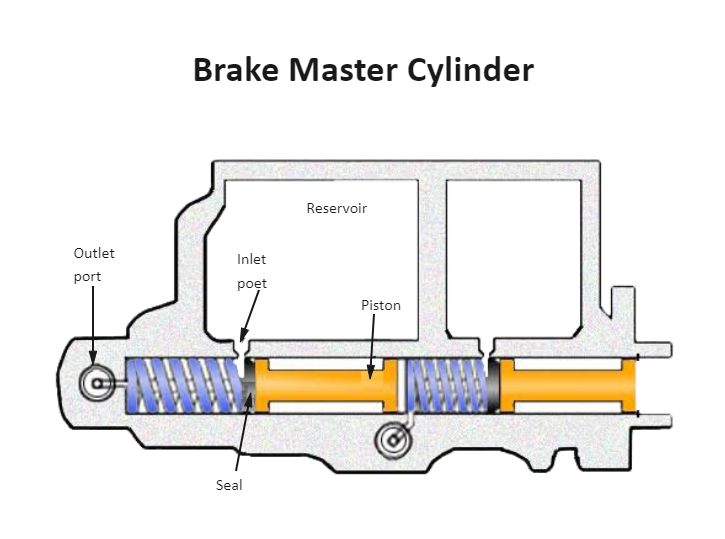
- Brake Master Cylinder: This is the heart of the brake system, responsible for converting the pressure from your brake pedal into hydraulic pressure for the brakes. Leaks here can be serious and significantly reduce braking power.
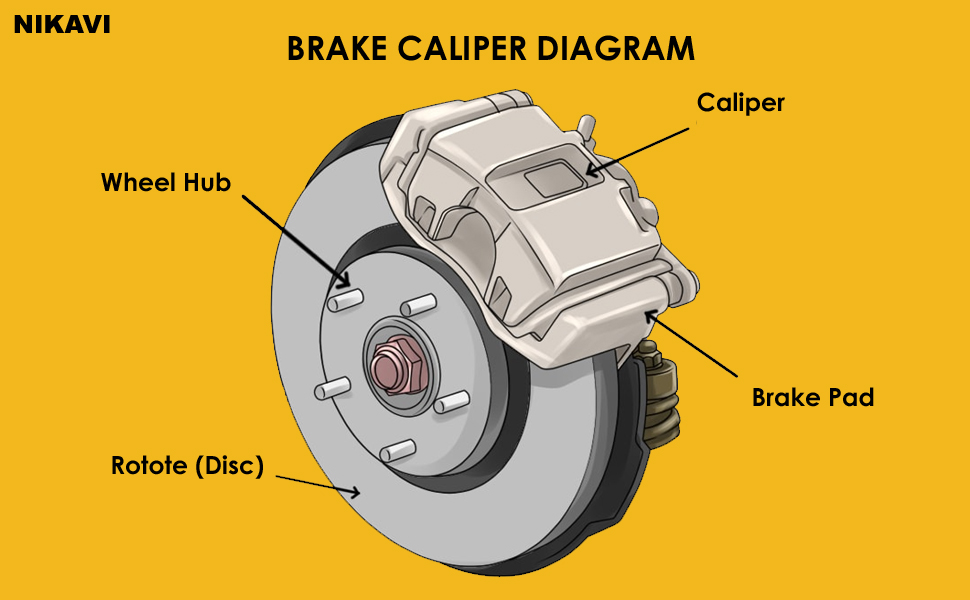
- Brake Calipers: These are the caliper-shaped components that clamp down on the brake rotors (discs) or drums (cylinders) to slow down the wheels. Leaks from the caliper piston seals or bleeder valves can cause uneven braking or complete brake failure on that wheel.
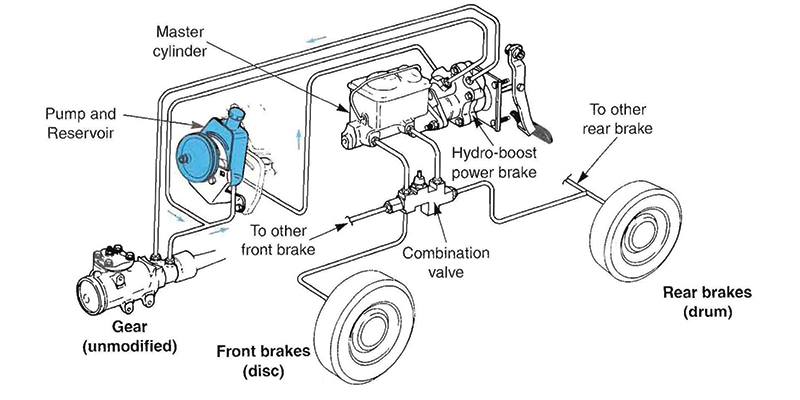
- Brake Lines: These are the metal tubes that carry brake fluid from the master cylinder to each wheel’s caliper or wheel cylinder. Rust, corrosion, or physical damage can cause leaks in the lines, affecting braking performance in one or more wheels.
- Brake Hoses: These are flexible hoses that connect the hard brake lines to the calipers or wheel cylinders. Over time, the rubber hoses can wear out and crack, leading to leaks.
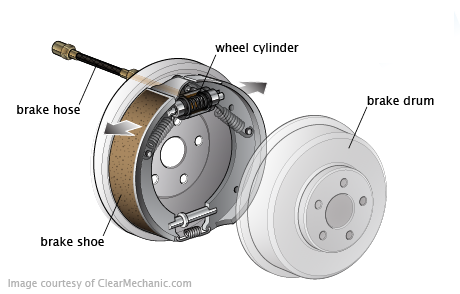
- Wheel Cylinder (Drum Brakes Only): In cars with drum brakes, the wheel cylinder is located inside the drum and pushes the shoes outward to create friction. Leaks from the wheel cylinder can cause uneven braking or complete brake failure on that wheel.
However, this list is not complete.
Leaks can potentially occur from any part of the brake system.
If you suspect a leak, it’s important to avoid self-diagnosis or repair.
Brake systems are complex and require a qualified mechanic to ensure proper diagnosis and safe repairs.
Reference Sources:
- For reliable information on general vehicle safety and potential causes of brake failure, refer to resources from the National Highway Traffic Safety Administration (NHTSA)
- For specific repair instructions and diagrams related to your car’s braking system, Haynes Repair Manuals can be a valuable resource
- For industry insights and best practices on diagnosing and repairing brake system leaks, refer to publications from automotive technician trade associations
